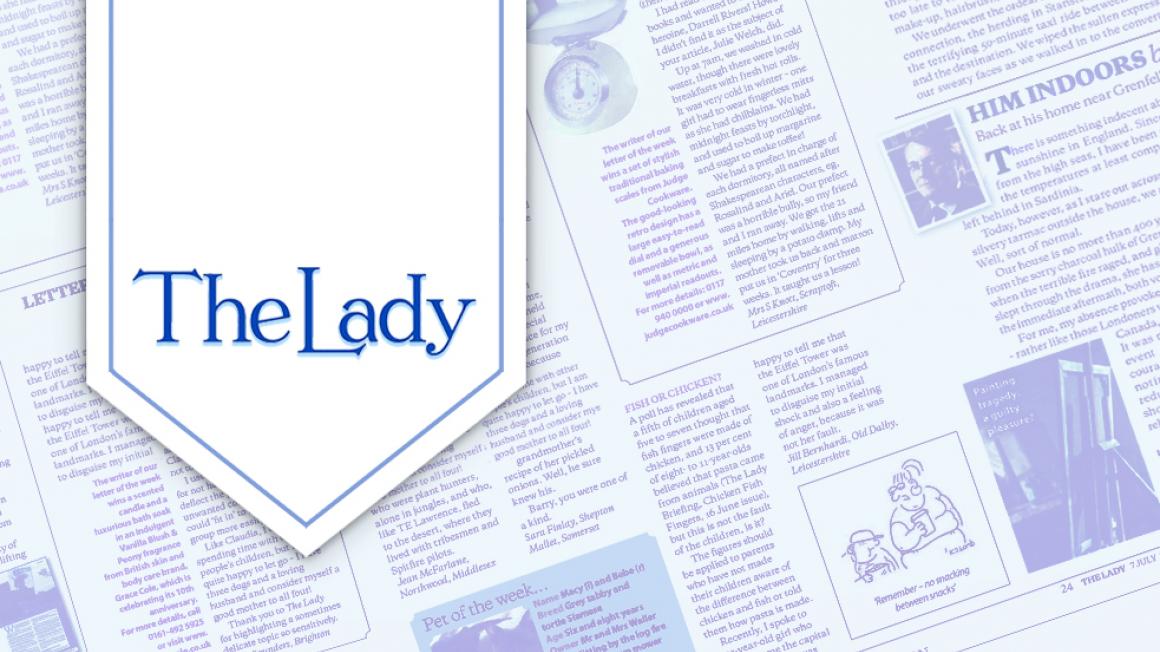Book Reviews: 21 June
OUT NOW
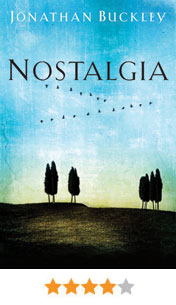 NOSTALGIA by Jonathan Buckley (Sort Of Books, £12.99; offer price, £11.69)
NOSTALGIA by Jonathan Buckley (Sort Of Books, £12.99; offer price, £11.69) Set in the imaginary Tuscan town of Castelluccio, Buckley creates an extremely detailed, arresting portrait, weaving its past and present, folklore and edifices, reality and dreams together with graceful ease.
It is the setting for the story of obsessive, enigmatic, selfexiled British painter Gideon Westfall and his loyal PA, Robert Bancourt.
Westfall’s highly ordered and regular working artist’s life is turned upside down by the arrival of his niece, Claire Yardley, who is trying to understand the mysterious family rupture between Gideon and her father, David.
The town itself is listless and anxious after the disappearance of local beauty Ilaria, who has modelled for Westfall.
Buckley is extremely adroit at creating suspense and psychological unease, almost as if this were a thriller, and, as the unhurried narrative unfolds, we become surprised at what we learn about the characters: all is not as it first seemed.
In particular, the depiction of the growing relationship between Claire and her artist uncle, although at first neither understands the other, is very moving, as is the novel’s affecting conclusion.
SB
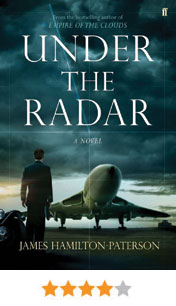 UNDER THE RADAR: A NOVEL by James Hamilton-Paterson (Faber and Faber, £14.99; offer price, £12.99)
UNDER THE RADAR: A NOVEL by James Hamilton-Paterson (Faber and Faber, £14.99; offer price, £12.99) In Empire Of The Clouds, Hamilton-Paterson conjured up a magisterial account of the vanished glories of British jet aviation. While this novel is not a sequel, it focuses on a small part of that story with remarkable clarity and pathos.
It is a tale of Britain’s nuclearequipped Vulcan bomber, one of the marvels of the Cold War when it was produced in the 1950s, and the stresses that affected the crews when they were an essential ‘leg’ of the strategy called MAD (mutually assured destruction).
As a riveting recreation of a period, it is a moving elegy with graceful prose and acute characterisation.
SB
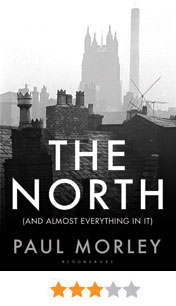 THE NORTH: AND ALMOST EVERYTHING IN IT by Paul Morley (Bloomsbury, £30; offer price, £16)
THE NORTH: AND ALMOST EVERYTHING IN IT by Paul Morley (Bloomsbury, £30; offer price, £16) Journalist and music critic Paul Morley, from Stockport, has put this painstaking critique about the North, and what it means to be Northern, together to set the record straight.
With this mournful, gentle memoir of his childhood and family, particularly his father, mixed in with history, geography and touching on the lives of many Northern innovators from the present day to the distant past, Morley, only half-Northern himself, does his adopted region proud.
He has immersed himself wholesale into a tribe whose invisible borders start at about Crewe and end, in the northwest, just above the Lake District, and just below Berwick-on-Tweed in the northeast.
The downside to this lengthy book is in Morley’s addiction to alliteration. His habit of writing long-winded lists in every chapter often gives it all an unmistakable flavour of the wicked Four Yorkshiremen sketch written by Monty Python’s Graham Chapman (from Leicester) and John Cleese (from Somerset).
Unfortunately, because Morley also favours the northwest, which is covered pretty comprehensively, references to the northeast are fewer – a great disappointment. One of his closing questions, wondering if he has achieved his aim to identify The North must therefore be said to be only partially answered.
Sarah Crowden
BOOK OF THE WEEK
Sage and the commandantJodi Picoult’s novel breaks new ground in the issues of guilt and forgiveness, says Steve Barfield
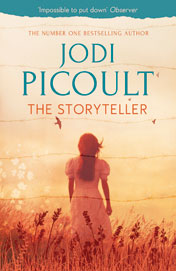 THE STORYTELLER by Jodi Picoult (Hodder & Stoughton, £19.99; offer price, £14.99)
THE STORYTELLER by Jodi Picoult (Hodder & Stoughton, £19.99; offer price, £14.99) Picoult is well known as a novelist for her bestselling explorations of families and the issues that beset them. But here she breaks new ground in an imaginative and gripping novel set partly in the contemporary United States, partly in Second World War Europe, and which is marked by the long, harrowing shadow of the Holocaust. She investigates problematic, important issues of morality, guilt, forgiveness and atonement and their consequences for human beings in an often surprising and resonant fashion.
A shy, sensitive young American woman, Sage Singer, is thrown into confusion when her likeable elderly neighbour, Josef Weber, asks for her help in an assisted suicide. It turns out though – in the first of many plot twists – this is because he has grown weary and disgusted of trying to atone for his role as a concentration-camp commandant in the Second World War. Sage’s grandmother, Minka, was a survivor of the camps.
From this unsettling premise, Picoult begins to explore diffi cult issues regarding what Sage should do. In assisting with euthanasia would she be carrying out revenge? Should Weber not be put on trial for his life? Is killing someone who has committed terrible crimes and wants to die justifi able? Is it possible or desirable for those who suffered in the Holocaust or their descendants to forgive the Nazi functionaries? There are powerful, disturbing questions, and it is to the writer’s credit that she never shies away from them, but they are embodied in the lives and relationships of her cast of characters.
The Storyteller asks us to extend our imaginations; the characters are credible and three-dimensional and their voices sound fresh and convincing. We learn Minka’s own tale, set in central Europe in the Second World War – like Scheherazade from the Arabian Nights it is Minka’s ability as a storyteller that allows her to survive – as a Nazi officer finds there is something compulsive about her narratives and he keeps her alive for that reason.
Impressive and arguably braver still, is the presentation of Weber’s own confessional story of being a concentration-camp commandant.
This is a thought-provoking, sometimes uncomfortable read, especially in the vivid detail of camp life, but is a very humanist affi rmation of the power of stories to allow people to move forward, even if they should never forget.
COFFEE TABLE BOOK
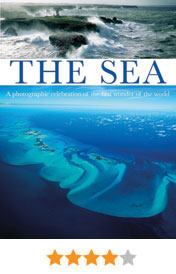 Where evolution began
Where evolution began THE SEA by Nic Compton (Arland Coles Nautical, £30; offer price, £25)
This is a sumptuous photographic celebration of the oceans of the world and the fascination they have held for humanity since our hazy beginnings. The sea is the source of all life on earth and where evolution began. It is the earth’s last great wilderness, filled with sublime mysteries. Yet, it is also historically the major conduit for trade and cultural interchange; hence such geocultural entities as Mediterranean civilisation.
There are glorious photographs drawn from the collection of the international agency Bluegreen Pictures, which represents many of the world’s most well-known maritime photographers. This book, an introduction to the vast collection, covers everything from yacht racing and exotic marine life, to seascapes and the world’s littorals and beaches.
Nic Compton has chosen an effective thematic organisation for the images, with such self-explanatory chapter titles as ‘Afloat’, ‘Paradise’, and ‘Ice’. But it could have used a stronger ecological perspective, as the world’s increasingly fragile oceans are under threat as never before.
SB
PAPERBACKS
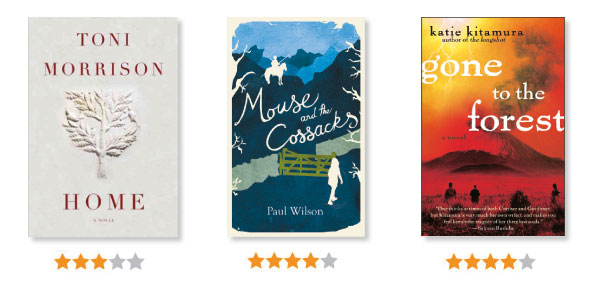
HOME by Toni Morrison (Vintage, £7.99; offer price £7.59) Set in America’s South during the 1950s, Frank is an African- American Korean War veteran struggling with post-traumatic stress. He escapes to visit his gravely ill sister, relying on the kindness of strangers along his journey. Bursting with poetic language and horrific events this is a penetrating insight to the African-American experience.
LG
MOUSE AND THE COSSACKS by Paul Wilson (Tindal, £11.99; offer price £10.79)
Paul Wilson explores the solitude and loneliness between two unique individuals. Mouse, a little girl who will not speak and William, who had been liaison offi cer for a group of Cossack refugees in the Second World War, will learn together how to lay their demons to rest.
LG
GONE TO THE FOREST by Katie Kitamura (Clerkenwell Books, £10.99; offer price, £8.99)
A young woman, Carine, disrupts the world of a settler plantation family, composed of a young man, Tom, and his patriarchal father. Long-simmering tensions start to explode as the country begins a bloody revolution.
SB
ALSO PUBLISHED
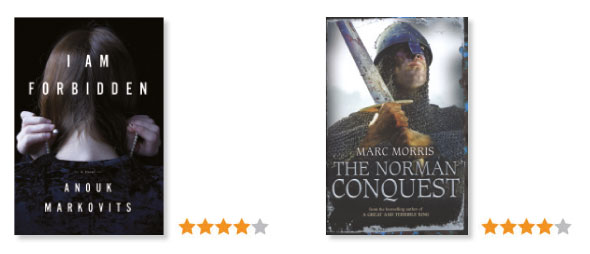
I AM FORBIDDEN by Anouk Markovits (Hogarth Press, £7.99; offer price, £7.59)An unusual, beautifully written multi-generational novel about the life of the ultra-Hassidic Jewish community, it spans four generations. At its core is the story of two childhood friends, Mila and Atara, who choose different destinies. When they meet years later, amidst terrible family revelations, Mila finds herself torn between love and the convictions of her faith. SB
THE NORMAN CONQUEST by Marc Morris (Windmill, £8.99; offer price, £8.54)
Every Briton knows that 1066 was the date of the conquest of England by William, Duke of Normandy. However, few know the details of the close-run battle of Hastings or of King Harold’s unlucky defeat. In this detailed but punchy retelling, Morris explores the conquest, encouraging the reader to do so with him, and it will make you rethink your ideas of the period.
SB
LITERARY PRIZE
Some novel hidden gems revealedThe winners of the award for overlooked British novels, by Stephanie Cross
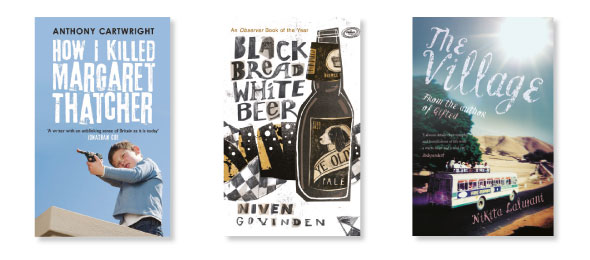
which aims to bring eight stars of British fiction to wider public notice.
Unlike other similar lists, Fiction Uncovered isn’t about hyping young debutantes, novelists of any age are eligible so long as at least one of their fictional works have previously been published.
This year’s judging panel – which included the popular books blogger Dovegreyreader – was chaired by the novelist and critic Louise Doughty, who noted the range of titles on the list: ‘Everything from thoughtful, elegiac books to rip-roaring reads and all the variations in between.’
THE FICTION UNCOVERED 2013 TITLES ARE
- All The Beggars Riding by Lucy Caldwell (Faber & Faber)
- How I Killed Margaret Thatcher by Anthony Cartwright (Tindal Street Press, Profi le)
- Black Bread White Beer by Niven Govinden (The Friday Project, Harper Collins)
- The Village by Nikita Lalwani (Viking, Penguin)
- The Colour Of Milk by Nell Leyshon (Fig Tree, Penguin)
- The Heart Broke In by James Meek (Canongate)
- Orkney by Amy Sackville (Granta)
- Secrecy by Rupert Thomson (Granta)
A pop-up radio station, Fiction Uncovered FM, will also hit the airwaves on 4 and 5 July. Available on 87.9 FM for people within a three-mile radius of the station’s base at London’s Foyles bookshop, it can also be accessed online through the Fiction Uncovered website.


